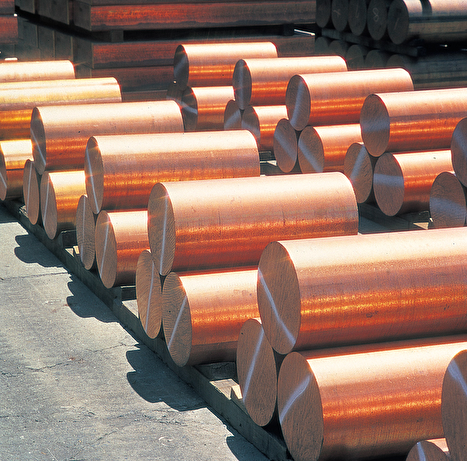Enhancing Your Kitchen with Premium Copper Products: Tips and Best Practices
Enhancing Your Kitchen with Premium Copper Products: Tips and Best Practices
Blog Article
Exploring the Diverse Applications of Copper Products in Modern Industries
Copper items have established themselves as crucial elements throughout a myriad of modern markets, primarily as a result of their exceptional conductivity, pliability, and resistance to corrosion. From improving the effectiveness of electrical systems to playing an essential function in eco-friendly power technologies, the versatility of copper appears. Its recyclability settings it as a lasting selection in manufacturing and electronics. As industries progressively prioritize technology and sustainability, the diverse applications of copper call for a closer evaluation, particularly regarding their potential influence on future technological improvements and environmental techniques.
Electric Applications of Copper
Copper is a crucial material in the electric industry, representing approximately 60% of the overall demand for non-ferrous steels internationally - Copper Products. Its remarkable electric conductivity, which is nearly twice that of light weight aluminum, makes it the recommended option for a broad range of electrical applications. From electrical wiring systems in commercial and property structures to high-voltage power transmission lines, copper ensures effectiveness and reliability in electrical power distribution
Along with electrical wiring, copper is integral to the manufacturing of electrical parts such as generators, motors, and transformers. These parts take advantage of copper's thermal conductivity and malleability, important for warm dissipation and effective performance. Copper's resistance to rust boosts the life-span and durability of electrical systems, making it an economical solution in the lengthy term.
The development of renewable resource sources, such as solar and wind power, has even more increased the demand for copper in electric applications. As markets transition in the direction of sustainable power services, copper's function ends up being much more essential. In general, the versatility and performance features of copper solidify its status as a keystone product within the electric market, driving innovation and performance throughout numerous applications.
Plumbing and Piping Solutions
In contemporary pipes systems, the choice of products significantly impacts both capability and longevity. Copper has actually arised as a favored choice as a result of its special properties, consisting of deterioration resistance and antimicrobial attributes. These characteristics make certain that copper piping remains sturdy and risk-free for transferring drinkable water, a vital consideration in property and business applications.
Among the vital advantages of copper in pipes is its ability to withstand high temperature levels and pressures, making it ideal for a range of applications, from warm water systems to home heating and cooling networks. Furthermore, copper's versatility permits less complicated setup in complicated piping formats, reducing the danger of leakages and failures.
Another noteworthy advantage is copper's lengthy life-span, usually exceeding 50 years with appropriate upkeep. This durability not just reduces replacement costs however likewise adds to lasting techniques by minimizing waste. Copper's recyclability straightens with modern environmental requirements, advertising a round economic situation within the pipes sector.
Copper in Renewable Resource
The adaptability of copper expands past plumbing applications, playing an essential duty in the renewable energy industry. Its exceptional electric and thermal conductivity makes it a necessary product in the manufacturing and distribution of renewable resource resources, specifically solar and wind power. In solar panels, copper is used in photovoltaic or pv cells and electrical wiring, facilitating reliable power conversion and transmission. Its resistance to rust ensures durable efficiency, which is vital for maximizing energy output over time.

Moreover, as the international need for electric automobiles (EVs) rises, copper's role in battery systems and billing framework comes to be much more considerable. The product's capability to conduct electrical power effectively is essential to the performance of EV batteries, enhancing range and charging speed.
Copper's Duty in Electronic devices
Electronic devices manufacturing counts heavily on copper's extraordinary residential properties, especially its high electrical conductivity and thermal performance. These qualities make copper an optimal choice for a large range of electronic components, consisting of adapters, motherboard, and electrical wiring. The metal's capacity to effectively transmit electrical signals makes certain very little energy loss, which is critical in high-performance electronic devices.
Furthermore, copper's thermal conductivity plays a significant function in heat dissipation, shielding sensitive parts from overheating. This is particularly crucial in modern electronic devices, where compact styles bring about increased heat generation. Copper is additionally favored for its pliability and ductility, allowing it to be quickly formed right into intricate styles that meet the demands of innovative digital applications.
With the increase of consumer electronic devices, telecoms, and electric lorries, the demand for copper in the electronics sector remains to grow. As technologies in technology advance, copper continues to be essential to attaining greater performance and reliability in digital items. Its recyclability even more enhances its charm, as suppliers seek sustainable services without compromising high quality. Hence, copper continues to be a cornerstone material in the ever-expanding field of electronic devices.
Innovative Uses in Manufacturing

One significant application is in additive production, where copper-based materials are used in 3D printing processes. This enables for the creation of intricate geometries and lightweight parts, especially in the aerospace and automobile fields. Furthermore, copper's thermal conductivity makes it an ideal option for warm exchangers, boosting performance in industrial air conditioning systems.
Moreover, the increase of smart production has seen the incorporation of copper in IoT tools, where its conductive capabilities sustain innovative sensing technologies. In the world of renewable resource, copper is critical in the manufacturing of solar panels and wind turbines, assisting in more reliable energy conversion and circulation.
As industries aim for sustainability and technology, copper's adaptability and performance remain to place it as a critical material, driving improvements in production and adding to the development of smarter, extra effective items.
Verdict
In summary, copper products demonstrate exceptional flexibility throughout various contemporary markets. Copper Products. Their premium conductivity enhances electrical applications, while corrosion resistance makes certain dependability in pipes. The important duty of copper in renewable resource and its essential feature in electronics highlight its significance beforehand sustainable techniques. Additionally, cutting-edge uses in producing highlight copper's adaptability and enduring importance. Jointly, these applications show copper's important payment to technical development and industrial efficiency in contemporary culture.
From improving the effectiveness of electrical systems to playing an important duty in sustainable energy modern technologies, the adaptability of copper is apparent. As industries increasingly focus on innovation and sustainability, the other varied applications of copper require a closer examination, specifically regarding their possible influence on future ecological methods and technical innovations.
The development of renewable energy sources, such as solar and wind power, has actually additionally increased the need for copper in electrical applications. Overall, the convenience and performance features of copper solidify its status as a cornerstone product within the electrical field, driving development and performance across different applications.
The versatility of copper extends past pipes applications, playing a vital function in the eco-friendly energy field.
Report this page